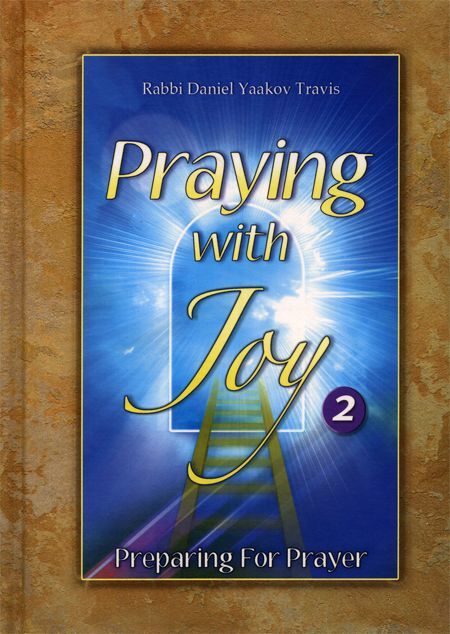
Specific Purpose
Since the "boss" feels like he can do whatever he wants whenever he wants, he doesn't feel like there's anybody around to punish him...

Section Three – Upper-level Emuna: Everything HaShem Does is for a Specific Purpose
What Does HaShem Want from Me?
The third and upper level of emuna is the belief that HaShem does everything for a specific purpose, and that each of HaShem’s actions conveys a special message aimed at helping us perform our task on earth. Moreover, upper-level emuna teaches that HaShem sends us incessant stimuli that call us to strengthen our connection with Him.
HaShem does everything for a purpose. Consequently, a person with upper-level emuna is constantly asking, "What does HaShem want from me?" Such a person’s thought process is logical and straightforward, as follows:
* Observation: HaShem exposes me to a certain event or experience in order to convey a message or to teach me something.
* Interpretation: I should do my best to relate HaShem’s message to something in my life that need’s reinforcement or improvement.
* Implementation: Either I need to correct a bad habit, atone for a transgression, strengthen my service of HaShem in a particular area, or to awaken from my spiritual slumber, and so forth
The three-stage process of observation, interpretation, and implementation can help anyone – each person in accordance with his or her own spiritual level – process HaShem’s messages and adjust what needs adjusting in their lives.
The overall message that connects between all the events, experiences, and stimuli of our lives is emuna. HaShem’s principle desire in His universe is to bring a person to emuna. As such, everything HaShem does induces a person to learn emuna; a person must consequently search for the message – the "Divine wisdom" – within a given event or experience that’s designed to bring him or her closer to complete emuna.
Rebbe Nachman of Breslov teaches (Likutei Moharan II:1) that we must all make an ongoing effort to observe the Divine wisdom in everything, and to connect ourselves to the Divine wisdom in everything. When we do, the Divine wisdom of a particular creation or event illuminates our brains and souls, drawing us closer to HaShem. But, one who neither observes nor connects oneself to the Divine wisdom of a particular creation or event resembles Esau, who scorned the birthright.
Shlomo HaMelech (King Solomon) scoffed at the fool’s failure to observe the Divine wisdom in everything when he said (Mishlei 18:2), "A fool doesn’t desire understanding." In other words, a fool fails to process any of HaShem’s messages, and therefore thinks that the events of his or her life are random, with no particular significance. Failure to observe is the worst form of blindness.
In essence, this entire book is built around the principle of searching for the Divine wisdom, or message, within everything. This principle is vast and deep, requiring extensive study. As a first step toward the effective observation that’s an integral part of upper-level emuna, one needs to internalize the Talmudic principle (see Tractate Shabbat 55a), "There are no tribulations without transgression."
There are No Tribulations without Transgression
This principle is the foundation of emuna, of Judaism, and of the entire world. The renowned 13th Century CE Kabbalist and Talmudic Sage, Ramban, Nachmanides, writes in his commentary on the Torah (Parshat Bo), "A person doesn’t earn a share in the Torah until he believes that every thing or event in life is a miracle! Nothing is the product of nature or natural course, whether on an individual or on a collective scale. The reward of one who fulfills the mitzvot is ultimate success, while the punishment of a transgressor is eventual doom, all by Divine edict." Simply speaking, one must first believe that everything in life is the product of the Creator’s tailor-made decree in order to believe that there are no tribulations without transgression. Without such emuna, one’s lacks a genuine connection to true Judaism.
Those with a general belief in Divine Providence, who fail to attribute their tribulations – even the tiniest – to a transgression, err in one of two ways:
1. They think that HaShem torments His creations for no reason, or that HaShem created the world so that His creations should suffer, heaven forbid. Dovid HaMelech (King David) testified (Tehillim 145:17), "HaShem is righteous in all His ways and magnanimous in all His deeds." He also declared (Ibid. 92: 16), "HaShem is just; my Rock in Whom there is no injustice." One who believes that HaShem torments His creations for nothing consequently has a warped notion of emuna.
2. They really don’t believe in Divine Providence like they say, but think that their tribulations are the result of fate, chance, or natural course, oftentimes blaming themselves or others for their difficulties in life. Such a notion is contrary to emuna.
We therefore logically conclude that a person who truly believes in Divine Providence – in other words, that everything comes from HaShem – must consequently believe that any sorrow, trouble, difficulty, and deficiency in his or her life comes from HaShem! Knowing that HaShem does everything for a specific purpose – and that HaShem is loving, just, and compassionate – leads us to the categorical conclusion that our transgressions are the reasons of our suffering.
At this point, you probably want to ask: "If HaShem is so kind and compassionate, then why does He punish me for my transgressions?" Good question; HaShem knows how terrible transgressions blemish our souls. Blemished souls diminish our ability to receive HaShem’s Divine light and prevent us from inheriting an optimal place in the World to Come. Therefore, HaShem sends us the tribulations that are capable of cleansing our souls. As such, life’s difficulties are not punishments, but soul corrections from a loving Father in Heaven, designed for our ultimate good and to stimulate spiritual gain.
The belief that there are no tribulations without transgression brings a person to happiness, especially when he or she seizes the opportunity of life’s difficulties to trigger a process of soul-searching that leads to enhanced spirituality and proximity to HaShem. Such people are constantly improving themselves. They view their difficulties in life as growth opportunities; this is true and complete emuna.
A Boss or a Servant?
A devout person does daily soul-searching and confesses his or her misdeeds to HaShem. One who doesn’t bother with soul-searching can’t be called a servant of HaShem, since he or she lives with the feeling that they’re the boss. A boss doesn’t have to give an account of his actions to anyone. A boss can do whatever he wants whenever he wants; one can’t be a boss and a servant at the same time.
Love and devotion motivates the most laudable servant. Fear of punishment motivates the least commendable servant. Since the "boss" feels like he can do whatever he wants whenever he wants, he doesn’t feel like there’s anybody around to punish him. By lacking the fear of punishment, the boss doesn’t even reach the spiritual plateau of the least commendable servant.
With even minimal fear of punishment, a person fears the consequences of wrongdoing and therefore makes a daily accounting of his or her transgressions, confesses to HaShem, and asks for His pardon. Such a person also prays for Divine assistance in avoiding wrongdoing.
An entrance-level servant hasn’t yet developed the love and respect of his master that leads to devoted service. Yet, the entrance level servant knows that he or she will be rewarded for good conduct and punished for laziness and negligence. By the same token, entrance-level emuna begins with the belief in reward and punishment: Whatever happens in life – good or bad, success or failure, pleasure or pain – all comes from HaShem.
As entrance-level emuna begins with the belief in reward and punishment, and the belief in reward and punishment is the outcome of recognizing that there are no tribulations without transgression, then cognizance that there are no tribulations without transgression is the prerequisite to basic emuna.
Everyone desires success and a pleasurable life. Transgressions upset the apple cart of happiness, since they create tribulations and suffering. Therefore, daily soul-searching, confession of wrongdoing, and subsequent efforts to improve our ways spare us of untold grief. If a person remains in a state of spiritual slumber and acts like a boss rather than a servant, then life’s difficulties – the result of his or her own misdeeds – become even more unbearable.
One who attributes life’s difficulties to anything or anyone other than his or her own transgressions is light-years away from minimal faith in HaShem! Such a person fails to account for his or her actions, never makes teshuva, falls deeper into spiritual slumber, and is therefore far removed from HaShem.
Yir’at Shamayim, the fear of HaShem, begins with the basic spiritual cognizance that tribulations result from wrongdoing. The basic fear of punishment leads to the lofty fear of disappointing our beloved and compassionate Father in Heaven by doing something against His Will.
Rebbe Nachman of Breslov explains (Likutei Moharan I:15) that a person’s fears are the result of his or her transgressions materializing themselves into various stimuli that come to frighten them, and therefore trigger soul-searching and repentance.
To be continued…














Tell us what you think!
Thank you for your comment!
It will be published after approval by the Editor.